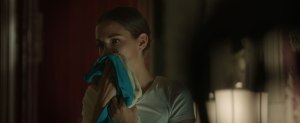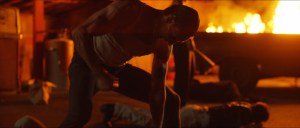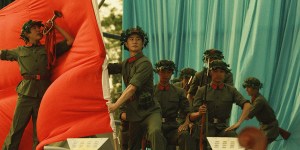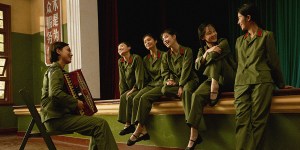Canadian sex and violence. Films Reviewed: Hollow in the Land, Birdland, Badsville PLUS Film Stars Don’t Die in Liverpool
Hi, this is Daniel Garber at the Movies for culturalmining.com and CIUT 89.5 FM.
Who said Canada is “nice but dull”? I’ve got three new indie Canadian movies this week, chock full of sex and violence. There’s torrid sex among the towers of Toronto, a bludgeoned body in the mountains of BC, and a gang war in the steamy southwest. …plus a UK romance set in Liverpool.
 Film Stars Don’t Die in Liverpool
Film Stars Don’t Die in Liverpool
Dir: Paul McGuigan
It’s 1980 in Liverpool. Peter (Jamie Bell) is an aspiring actor who gets a surprise call from an older actress. She’s in the UK performing on stage in The Glass Menagerie and wonders if she can come by. Gloria Graham (Annette Bening) is a former movie star who won an Oscar in the 1950s. She talks like Marilyn Monroe and looks like Gloria Swanson. She was once known for “playing the tart”  in Hollywood dramas. Now she wears large sunglasses and silk scarves over her hair.
in Hollywood dramas. Now she wears large sunglasses and silk scarves over her hair.
Peter is surprised to hear from her again. He met her a year ago at a London rooming house which led to a torrid affair spanning two continents. He visited her at her beach house in California and followed her to New York. But she dumped him unceremoniously at her Manhattan apartment and he never understood why. And now she’s back again  asking to stay with him in his working class home with his dowdy mother Bella (Julie Walters). Is it because film stars don’t die in Liverpool?
asking to stay with him in his working class home with his dowdy mother Bella (Julie Walters). Is it because film stars don’t die in Liverpool?
Film Stars Don’t Die in Liverpool is a wonderful romance based on Peter Turner’s memoirs about his encounters with a once famous actress twice his age. Bening is  perfect as an over-the-hill diva who still sees herself as a Shakespearean teenaged Juliet while rejecting aging and her own mortality. And Bell is endearing as the starstruck Peter.
perfect as an over-the-hill diva who still sees herself as a Shakespearean teenaged Juliet while rejecting aging and her own mortality. And Bell is endearing as the starstruck Peter.
The story is straightforward but the director experiments with style. Peter has flashbacks while walking through a door signalled by a subtle change in lighting and music. And surprising results come from identical scenes which are shown twice but with very different points of view.
Definitely worth seeing.
Wri/Dir: Scooter Corkle
It’s nowadays in the BC interior, a land of mountains, pulp mills and grow-ops. Ally (Dianna Agron) is a pretty but tough woman in her twenties, blonde hair beneath her hardhat. By day, she works at the town pulp mill, and at night looks after her 17-year-old brother Brandon (Jared Abrahamson). And every so often she spends the night with her lover Char (Rachelle Lefevre). Ally may be Brandon’s sister but she acts like his mother, warning him to stay out of trouble with the cops – or they’ll throw him in jail, just like their dad. He’s in prison for running down a teenager while drunk. And the kid he killed happenis to be the son of the family that owns the pulp mill. Which is very bad news in a company town.
The two cops – friendly Darryll (Shawn Ashmore) and hard-ass Chief (Michael Rogers) – never let them forget it. So when a dead body turns up, and Brandon is the chief suspect, only Ally believes in her brother. It’s up to her to play detective, follow the clues, uncover the motive, track down the killer and find her brother who ran away into he woods. And she has to do all this before the killer kills her.
never let them forget it. So when a dead body turns up, and Brandon is the chief suspect, only Ally believes in her brother. It’s up to her to play detective, follow the clues, uncover the motive, track down the killer and find her brother who ran away into he woods. And she has to do all this before the killer kills her.
Hollow in the Land is a pretty good detective mystery/thriller, but with a few problems. I get that it’s noir so most of the scenes are at night, but you’d think they’d light up people’s faces properly so you can see who’s who. But the BC locations are amazing. The movie starts out very confusing, with dozens of characters and a foggy plot, but as it develops, it gets much more interesting. And Diana Agron is great as Ally – tough but tender — who carries it through to a satisfying end.
Dir: Peter Lynch
It’s present-day Toronto. Shiela (Kathleen Munroe) is a tough as nails former cop with her own security firm. She’s a whiz with surveillance cameras and disguises. Her mild-mannered husband Tom (David Alpay) works at a museum cataloguing bird carcasses. But when she discovers he’s having an affair with a mysterious woman in a blue kimono, she decided to investigate. But when the affair leads to murder she realizes  it’s all much bigger than she suspects. And someone is trying to cover it up. There’s an oil magnate pulling strings, a protester, a femme fatale, a nightclub entrepreneur, and a cop — her ex-partner — investigating the crime. And they all seem to share the same hobby —
it’s all much bigger than she suspects. And someone is trying to cover it up. There’s an oil magnate pulling strings, a protester, a femme fatale, a nightclub entrepreneur, and a cop — her ex-partner — investigating the crime. And they all seem to share the same hobby —  BDSM sex parties. Who is the killer? Who is having sex with whom? And who’s behind the conspiracy?
BDSM sex parties. Who is the killer? Who is having sex with whom? And who’s behind the conspiracy?
Birdland is full of politics, Big Oil, the police, museums, nightclubs, detectives, and kinky sex. And everything is projected against a fabricated bird metaphor: there’s a man named Starling, an ornithologist, a nightclub with a bird concept, characters who sing Lullaby in Birdland, a bird rescue team… But what’s the point? The “bird” themes don’t come from the characters, it’s superimposed on them. There are some cool concepts and images in Birdland, but it just doesn’t work. I was never sure if I was watching a messy story to justify the not-so-sexy, softcore porn, or if the sex was there to justify an extremely confusing plot. It might work as a miniseries but it packs in too much stuff for a single movie.
Dir: April Mullen (Written by Benjamin Barrett and Ian McLaren)
It’s a dead-end town in the southwest in the 1950s (or 60s?). Wink and Benny (Ian McLaren and Benjamin Barrett) are lifelong friends and members of the Kings, a local gang. Wink works in a greasy spoon and hangs with his buddies in the seedy bar or bowling alley. He serves as a mentor for Lil’ Cat (Gregory Kasyan), a local kid with a junkie for a mom. Wink wants him to “stay gold”. The Kings are mainly Latino while their rivals, the Aces, are white. They regularly meet to  rumble, meaning big fistfights supplemented with metal pipes and pieces of wood, all lit up by blazing oil drums.
rumble, meaning big fistfights supplemented with metal pipes and pieces of wood, all lit up by blazing oil drums.
Sounds like fun.
But when he falls for Suzy (Tamara Duarte) a newcomer with a secret past, it looks like things are going to change. Wink might finally achieve his dream – escaping Badsville for a better life in Colorado. And this is what pushes Benny over the edge. He loves Daddio – that’s what he calls Wink – and not just as a friend. So he sets in  motion a series of events that he hopes will stop Wink from leaving, but that end up putting all their lives in jeopardy.
motion a series of events that he hopes will stop Wink from leaving, but that end up putting all their lives in jeopardy.
Badsville is a new take on classic exploitation gang movies and SE Hinton novels. We’re talking Jets and Sharks here, not Crips and Bloods. And they’re not in high school either, they’re much older. The film looks at masculinity and friendship with a bit of racial politics in the mix. Directed by April Mullen, it’s a first effort by the two non-actors who play Benny and Wink, and also wrote the script. It’s low budget and not perfect – but it works.
Film Stars Don’t Die in Liverpool, Hollow in the Land, Birdland and Badsville all start today in Toronto; check your local listings.
This is Daniel Garber at the Movies, each Friday morning, on CIUT 89.5 FM and on my website, culturalmining.com.
Strong female roles. Films reviewed: In the Fade, The Little Girl Who Was Too Fond of Matches PLUS Forever My Girl
Hi, this is Daniel Garber at the Movies for culturalmining.com and CIUT 89.5 FM.
It’s funny. A few years ago I was wondering what happened to all the female movie stars? They had been pushed into the margins, with hardly any good female roles. This year, though, there are more great female performances than you shake a stick at. Saoirse Ronan in Lady Bird, Francis McDormand in Three Billboards, Sally Hawkins in The Shape of Water, Daniela Vega in A Fantastic Woman, Claire Armstrong in Dim the Fluorescents, Annette Bening in Film Stars Don’t Die in Liverpool, and so on.
So this week I’m looking at some more powerful performances by women in very intense movies. There’s a woman in Hamburg confronting Nazi terrorists, and an isolated teenager in rural Quebec reacting to the outside world.
 The Little Girl Who Was Too Fond of Matches (La petite fille qui aimait trop les allumettes)
The Little Girl Who Was Too Fond of Matches (La petite fille qui aimait trop les allumettes)
Wri/Dir: Simon Lavoie
It’s some point in the distant past in rural Quebec. Two brothers with dirty faces and scruffy hair (Marine Johnson and Antoine L’Écuyer) live with their father on an isolated farm in the woods. They’re close enough to the next village to hear churchbells in the distance, but they never go there. It’s a grand old stone manor filled with empty rooms and whole sections blocked off. The teenaged boys are forbidden from seeing them. If you go there, says their father (Jean-François Casabonne) you will die.
The house is lit by church candelabra arranged on altars with lanterns carried through the dark halls. The boys can read but most books are forbidden. They listen to liturgical records on their wind-up gramophone. And the younger brother sometimes visits a terrible monster, locked up in a dark shed. He feeds it apples and pieces of bread through gaps in a wooden cage.
The boys dress in frontier clothes and priest’s hassocks. Younger brother has to keep watch – his bullying older brother often jumps him in the woods and does something to him he doesn’t understand. He keeps his chest tightly  wrapped in cloth – his father insists. But he still has questions. He has seen pigs mating in the sty. Why don’t I have a penis? His father says, I told you, it fell off when you were younger. He also believes babies are made out of clay.
wrapped in cloth – his father insists. But he still has questions. He has seen pigs mating in the sty. Why don’t I have a penis? His father says, I told you, it fell off when you were younger. He also believes babies are made out of clay.
It’s a rough life, but it’s all they know, save for faint memories of a beautiful woman in a white dress, and two little girls in pinafores. In fact they can’t remember ever seeing someone from the outside. Until one day when a young man (Alex Godbout) drives to the house on a motorcycle. The town needs to survey the property, he says, but Père and Frère chase him away with their rifles. Is he a knight in shining armour? Or does  he signal an invasion by the churchgoing villagers? And when something happens to Père, the two boys discover the house’s secrets, and some of their own. Like the fact that the younger brother… is pregnant!
he signal an invasion by the churchgoing villagers? And when something happens to Père, the two boys discover the house’s secrets, and some of their own. Like the fact that the younger brother… is pregnant!
The Little Girl Who Was Too Fond of Matches is a powerful, surreal drama with an almost fairytale feel. It tells the story of naïve teenagers whose father (who went mad) is their only source of information. It’s shot in stunning black and white, and is filled with sinister images of the all-pervasive Québec church. It’s creepily fascinating with fantastic acting by L’Écuyer and Johnson. This is a great — but highly disturbing — movie.
Wri/Dir: Fatih Akin
It’s present-day Hamburg. Katja Sekerci (Diane Kruger) is a happily married woman with a young son named Rocco. She likes artistic tattoos, going to saunas with her best friend Brigitte and making love to her husband. Nuri is of Kurdish ancestry, but wears his hair like a samurai. They were married when he was still in prison. Now he runs a translation office in a Turkish section of town.
Katja’s life is nearly perfect until something devestating happens. An explosioin levels her husband’s office killing him and their son. It turns out it was a bomb, possibly the work of terrorists. And Katja thinks she knows who did it. She saw a blonde woman park her bike right in front of the office on the day of the explosion. In fact she even spoke to her so she knows she’s German. But the police, the press, even her own mother, keep looking at the victim as the cause of the killing. Is it the Turkish Mafia. Islamic  terrorists? Drugs?
terrorists? Drugs?
Katie talks with Danilo her lawyer and good friend (Denis Moschitto) to make sense of it all. They realize it must be be a right wing terrorist — a nazi — who did this. Eventually the police make an arrest based on her description, and two Nazis, a young couple named Edda and Andre Möller (Hanna Hilsdorf, Ulrich Brandhoff) are put on trial for the killings. But will they be convicted?
In the Fade is a great dramatic thriller that combines Katja’s grief and sorrow with her need for vengeance. It’s told in three chapters: her interactions with her family, in-laws and the police; the trial itself; and the heart-pumping aftermath, when she decides to track down and punish the killers. Diane Kruger is just fantastic as Katje, the best I’ve ever seen her, and she puts her whole body and soul into the part. You can really feel her anger, grief and frustration, but she never overacts.
I liked this movie a lot.
Also opening today is this romantic drama:
Wri/Dir: Bethany Ashton Wolf (based on the novel by Heidi McLaughlin)
Liam Page (Alex Roe) is a Country & Western superstar. He writes and performs his own songs with a back-up band. He can fill a New Orleans stadium with adoring fans. Teenaged girls will chase him, screaming, down a city street when he appears in public. They love his smooth voice, handsome face and his sentimental songs. But offstage Liam is a real prick. He’s emotionally vapid, sleeping with different groupies each night. He’s rude and abusive toward his affable, bearded manager Sam (Peter Cambor) and his LA publicist Doris. And he’s addicted to alcohol and drugs.
He carries only one thing to remind him of his life as a smalltown boy: an old flip phone with a recorded  message. But after a tragic turn of events, he finds himself back in his hometown, St Augustine, LA, for a funeral. He may be famous, but in “the Saint” his name is mud. You see, he was engaged to marry his highschool sweetheart Josie (Jessica Rothe) eight years earlier, but left her standing at the altar, without an explanation or apology. When she sees him now, Josie greets him with a sucker punch. And he discovers he has a 7-year-old daughter named Charly (Abby Ryder Forston) that Josie has been raising on her own.
message. But after a tragic turn of events, he finds himself back in his hometown, St Augustine, LA, for a funeral. He may be famous, but in “the Saint” his name is mud. You see, he was engaged to marry his highschool sweetheart Josie (Jessica Rothe) eight years earlier, but left her standing at the altar, without an explanation or apology. When she sees him now, Josie greets him with a sucker punch. And he discovers he has a 7-year-old daughter named Charly (Abby Ryder Forston) that Josie has been raising on her own.
Can Liam change his ways and conquer his demons? Will Josie ever talk to him again? Can he spend time with his precocious daughter? And can his father, the town preacher, forgive his selfish son?
 I’m not a big fan of country music or conventional romances involving small-town churchgoers — this is not the kind of movie I rush to see. It takes few risks and most of the characters walked straight out of Central Casting. But I found it entertaining anyway. I assumed the aw-shucks, southern boy Liam was played by a non-actor, a country singer who basically played himself — woodenly, at that — and performed his own tunes. Turns out I was way off the mark. This UK actor had me convinced he was a real country singer from the Deep South!
I’m not a big fan of country music or conventional romances involving small-town churchgoers — this is not the kind of movie I rush to see. It takes few risks and most of the characters walked straight out of Central Casting. But I found it entertaining anyway. I assumed the aw-shucks, southern boy Liam was played by a non-actor, a country singer who basically played himself — woodenly, at that — and performed his own tunes. Turns out I was way off the mark. This UK actor had me convinced he was a real country singer from the Deep South!
In the Fade and Forever My Girl open today in Toronto; check your local listings. The Girl Who Was Too Fond of Matches is playing at Canada’s Top Ten festival; go to TIFF.net for details. Also opening today is Hostiles (read my review here) and My Piece of the City (listen to my interview with director Moze Mossanen here).
This is Daniel Garber at the Movies, each Friday morning, on CIUT 89.5 FM and on my website, culturalmining.com.
e
Daniel Garber talks with Cynthia Banks about The Caregivers Club
 Hi, this is Daniel Garber at the Movies for culturalmining.com and CIUT 89.5 FM.
Hi, this is Daniel Garber at the Movies for culturalmining.com and CIUT 89.5 FM.
A malady is sweeping the nation, an illness with no effective medication, no clear cause and no known cure. It starts out mild but its effects get worse and worse, ultimately leading to death. More than half a million Canadians suffer from it. What is this plague? HIV? Opioid addiction? Bird flu? No, I’m talking about dementia caused by Alzheimers. And patients with dementia need constant care.
The Caregivers Club is a new documentary that looks at three  patients with early-onset dementia and the very different decisions made by the people who care for them. It follows a mother who lives in her own home with caregivers hired by her adult daughter; a wife assisted by her husband; and a man who lives in a nursing home as his wife raises their three young kids. The film was written and directed by noted Toronto documentarian Cynthia Banks.
patients with early-onset dementia and the very different decisions made by the people who care for them. It follows a mother who lives in her own home with caregivers hired by her adult daughter; a wife assisted by her husband; and a man who lives in a nursing home as his wife raises their three young kids. The film was written and directed by noted Toronto documentarian Cynthia Banks.
I spoke to Cynthia by telephone from CIUT.
The Caregivers Club is playing on CBC Docs-POV at 9:00 pm on Sunday, and streaming online beginning today.
A plastic medium. Films reviewed: Luk’Luk’I, Happy End, Les Affamés
Hi, this is Daniel Garber at the Movies for culturalmining.com and CIUT 89.5 FM.
Film is a very plastic medium, with filmmakers free to do just about anything as long as it ends up looking like a movie. This week, I’m looking at three new movies where characters (or actors) shift their roles in unexpected ways. There’s horror from Quebec where friendly characters turn into monsters; a Vancouver drama where real people play themselves; and a dark comedy where actors repeat characters they played in other movies… though not exactly.
Dir: Wayne Wapeemukwa
It’s 2010 in Vancouver, and the world’s best athletes are streaming into town for the winter Olympics. Crowds of rowdy yahoos in red and white hockey sweaters fill the streets. Scalped tickets are selling for hundreds of dollars, and downtown houses for millions. This is a city oozing with wealth.
But the people on Hastings in the rundown east end are still struggling to get by. Ken (Ken Harrower) is a soft-spoken gay guy who gets around in a motorized wheelchair. He likes  playing bingo and meeting new friends. He has a wad of cash set aside to buy tickets to a big Olympic event. He runs into Rollergirl (Angela Dawson), an outspoken transwoman who performs fancy skate manoeuvres on her roller blades. She wants to share in the excitement. There’s Angel (Angel Gates) a buxom, indigenous sex worker all dressed in pink and black, who sees the Olympics as a good source of potential business. Eric (Eric Buurman) is an older drug user, always looking for his next hit. But he has a son out there he hasn’t seen in many years. And Mark (Joe Buffalo) has a close encounter of the third kind.
playing bingo and meeting new friends. He has a wad of cash set aside to buy tickets to a big Olympic event. He runs into Rollergirl (Angela Dawson), an outspoken transwoman who performs fancy skate manoeuvres on her roller blades. She wants to share in the excitement. There’s Angel (Angel Gates) a buxom, indigenous sex worker all dressed in pink and black, who sees the Olympics as a good source of potential business. Eric (Eric Buurman) is an older drug user, always looking for his next hit. But he has a son out there he hasn’t seen in many years. And Mark (Joe Buffalo) has a close encounter of the third kind.
Luck’Luk’I is an experimental look at the overlooked side of Vancouver, the homeless and  disenfranchised, the street walkers, drug users and local characters. It tells five loosely linked stories. The film wavers in an unexplored zone somewhere between documentary and drama. Most of the parts are played by actors playing themselves, and retelling their own stories. The director gives them writing credits. Sometimes he even hands them the camera with mixed
disenfranchised, the street walkers, drug users and local characters. It tells five loosely linked stories. The film wavers in an unexplored zone somewhere between documentary and drama. Most of the parts are played by actors playing themselves, and retelling their own stories. The director gives them writing credits. Sometimes he even hands them the camera with mixed  results. At the same time, the film always seems a bit stilted because it emphasizes realism over drama. There are some genuinely moving parts, but I had to keep asking myself – is this a real event or a reenactment I’m witnessing? Or did it happen at all? Well worth seeing, but view it like a work of art, a Jeff Wall photo come to life.
results. At the same time, the film always seems a bit stilted because it emphasizes realism over drama. There are some genuinely moving parts, but I had to keep asking myself – is this a real event or a reenactment I’m witnessing? Or did it happen at all? Well worth seeing, but view it like a work of art, a Jeff Wall photo come to life.
Dir: Michael Haneke
Georges Laurent (Jean-Louis Trintignant) is the patriarch of a Laurent enterprises a huge corporation based in Calais France. It’s run by his daughter Anne (Isabelle Huppert) a no-nonsense business woman. Her brother Thomas (Mathieu Kassovitz) a successful surgeon, lives on the family estate with his young wife Anaïs. Then there’s the third generation. Pierre (Franz Rogowski) Anne’s son, knows how to wear a hard hat, but that’s about it. He’s responsible for a disaster that happens at a construction site. And Thomas’s daughter Eve (Fantine Harduin)  from a previous marriage re-enters his life when his ex-wife suddenly gets sick. This cute and innocent little girl is not as nice as she seems. She’s a tiny psychopath who does horrible things just for the lulz – and to share them anonymously
from a previous marriage re-enters his life when his ex-wife suddenly gets sick. This cute and innocent little girl is not as nice as she seems. She’s a tiny psychopath who does horrible things just for the lulz – and to share them anonymously  on Snapchat. And Georges, the patriarch, desperately wants to end it all.
on Snapchat. And Georges, the patriarch, desperately wants to end it all.
Happy End is a very dark comedy about a rich, dysfunctional family. Haneke its great director, does something really unusual: He recreates characters from a previous film, but with an entirely different back story. Amour, Which won an Oscar in 2013, was about an elderly musician man, Georges, facing his wife’s dementia. In Happy End, Georges (and his daughter) are back again played by the same actors, but this time not as musicians but as corporate leaders. And this time it’s a comedy not a tragic romance. Another great movie.
Wri/Dir: Robin Aubert
It’s present-day rural Quebec, bucolic pastures where cows chew their cud and inchworms travel along twigs. There’s an F1 racetrack nearby., Bonin (Marc-André Grondin) runs a hunting club, and likes telling dirty jokes with his buddy Vezina. Pauline and Therese run a gas station, and are into home canning. And kids like Ti-cul and Zoe (Charlotte St-Martin) live ordinary lives with their families on farms. But something strange is happening. People stand in their fields staring off into the distance. Others carry wooden chairs to build a strange tower. A woman sits in the grass playing with a doll. What’s going on?
It’s a strange disease like leprosy that turns your fingers black and makes you split dark blood. And then suddenly you’re a zombie starving for human flesh. These zombies don’t grunt and drag their feet; they communicate using shouts and screams and run at breakneck speed to capture unchanged humans to eat. It’s up to the ones still alive – plus Tania (Monia Chokri) who says she was bitten by a dog, and a former “perfect wife” who now wields a machete – to band together and survive the onslaught. They share food and
And then suddenly you’re a zombie starving for human flesh. These zombies don’t grunt and drag their feet; they communicate using shouts and screams and run at breakneck speed to capture unchanged humans to eat. It’s up to the ones still alive – plus Tania (Monia Chokri) who says she was bitten by a dog, and a former “perfect wife” who now wields a machete – to band together and survive the onslaught. They share food and  set up hundreds of mousetraps all around their house as a low-tech early-warning system. Who will survive? And can they stop the zombie-pocalypse?
set up hundreds of mousetraps all around their house as a low-tech early-warning system. Who will survive? And can they stop the zombie-pocalypse?
Les Affamés (or The Hungry Ones) is a neat take on the zombie flic. It doesn’t differ too much from a Romero movie or TV shows like the Walking Dead, just enough to keep you guessing. Beautiful images (like Tania ducking down in a field of low ferns to hide from the hungry ones), are a pleasure to watch. Great acting — the cast has some big Quebec names — and the combination of humour and terror works well.
If you like zombie movies, this is a good one to watch.
Happy End starts today in Toronto; check your local listings. And Les Affamés and Luk’ Luk’I are now playing at Canada’s Top Ten Film Festival. Also at TIFF, Daniel Cockburn’s You Are Here – maybe the strangest movie you’ve ever seen – is playing on the free screen. Go to tiff.net for details.
This is Daniel Garber at the Movies, each Friday morning, on CIUT 89.5 FM and on my website, culturalmining.com.











2 comments